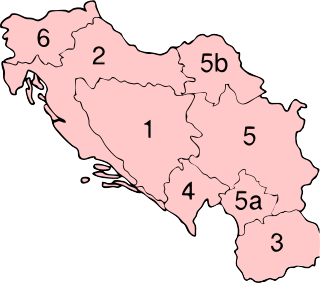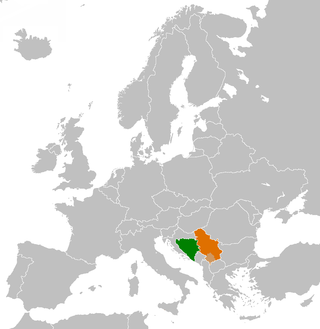
The member states of the United Nations comprise 193 sovereign states. The United Nations (UN) is the world's largest intergovernmental organization. All members have equal representation in the UN General Assembly.

United Nations Security Council resolution 724, adopted unanimously on 15 December 1991, after reaffirming resolutions 713 (1991) and 721 (1991) and noting a report by the Secretary-General Javier Pérez de Cuéllar on the situation in the Socialist Federal Republic of Yugoslavia, the council agreed to carry forward proposals for a planned peacekeeping operation in Yugoslavia and decided to establish a committee of the Security Council to consider matters relating to the arms embargo on the country.

United Nations Security Council resolution 727, adopted unanimously on 8 January 1992, after reaffirming resolutions 713 (1991), 721 (1991), 724 (1991) and considering a report by the Secretary-General Boutros Boutros-Ghali, the council welcomed the recent signing of an agreement in Sarajevo regarding a ceasefire to the conflicts in the Socialist Federal Republic of Yugoslavia.

United Nations Security Council resolution 740, adopted unanimously on 7 February 1992, after reaffirming resolutions 713 (1991), 721 (1991), 724 (1991) and 727 (1992) and considering a report by the Secretary-General Boutros Boutros-Ghali, the Council approved plans for a peacekeeping mission in the Socialist Federal Republic of Yugoslavia.

United Nations Security Council resolution 758, adopted unanimously on 8 June 1992, after reaffirming resolutions 713 (1991), 721 (1991), 724 (1991), 727 (1992), 740 (1992) 743 (1992), 749 (1992), 752 (1992) and 757 (1992), the council, in accordance with a report by the Secretary-General Boutros Boutros-Ghali, decided to enlarge the mandate and strength of the United Nations Protection Force (UNPROFOR) in former Yugoslavia.

United Nations Security Council resolution 815, adopted unanimously on 30 March 1993, after reaffirming Resolution 743 (1992) and all subsequent relevant resolutions concerning the United Nations Protection Force (UNPROFOR) including 802 (1993) and 807 (1993), the council, acting under Chapter VII of the United Nations Charter, extended UNPROFOR's mandate for an additional interim period ending 30 June 1993.

United Nations Security Council resolution 820, adopted on 17 April 1993, after reaffirming all previous resolutions on the topic for a lasting peace settlement in Bosnia and Herzegovina and the region, the council discussed the peace plan for Bosnia and Herzegovina and comprehensive steps to ensure its implementation.

United Nations Security Council resolution 824, adopted unanimously on 6 May 1993, after considering a report by the Secretary-General Boutros Boutros-Ghali pursuant to Resolution 819 (1993), the council discussed the treatment of certain towns and surroundings as "safe areas" in Bosnia and Herzegovina.

United Nations Security Council resolution 827, adopted unanimously on 25 May 1993, after reaffirming Resolution 713 (1991) and all subsequent resolutions on the topic of the former Yugoslavia, approved report S/25704 of Secretary-General Boutros Boutros-Ghali, with the Statute of the International Tribunal as an annex, establishing the International Criminal Tribunal for the former Yugoslavia (ICTY).
United Nations Security Council resolution 844, adopted unanimously on 18 June 1993, after reaffirming Resolution 713 (1991) and subsequent resolutions, the Council noted deteriorating situation in Bosnia and Herzegovina and authorised a reinforcement of the United Nations Protection Force (UNPROFOR).

United Nations Security Council resolution 847, adopted unanimously on 30 June 1993, after reaffirming Resolution 743 (1992) and subsequent resolutions relating to the United Nations Protection Force (UNPROFOR), the council condemned military attacks in Croatia and Bosnia and Herzegovina and extended the mandate of UNPROFOR until 30 September 1993.

United Nations Security Council resolution 871, adopted unanimously on 4 October 1993, after reaffirming resolutions 713 (1992) and 743 (1992) and subsequent resolutions relating to the situation in the former Yugoslavia and United Nations Protection Force (UNPROFOR), the Council expressed concern that United Nations peacekeeping plan for Croatia, in particular Resolution 769 (1992), had not been implemented and went on to discuss the peace plan and extend UNPROFOR's mandate until 31 March 1994.

United Nations Security Council resolution 942, adopted on 23 September 1994, after reaffirming all resolutions on the situation in Bosnia and Herzegovina, the Council reinforced measures relating to safe areas under control of Bosnian Serb forces.

United Nations Security Council resolution 943, adopted on 23 September 1994, after reaffirming all resolutions on the situation in Bosnia and Herzegovina, the Council suspended some restrictions against the Federal Republic of Yugoslavia and discussed the closure of the border between both countries.

United Nations Security Council resolution 947, adopted unanimously on 30 September 1994, after recalling all resolutions on the situation on the former Yugoslavia including Resolution 908 (1994), the Council discussed the situation in Croatia and extended the mandate of the United Nations Protection Force (UNPROFOR) until 31 March 1995.

United Nations Security Council resolution 992, adopted unanimously on 11 May 1995, after reaffirming all resolutions on the situation in the former Yugoslavia, including 820 (1993), the Council addressed freedom of navigation in the Danube River.

United Nations Security Council resolution 1003, adopted on 5 July 1995, after reaffirming all resolutions on the situation in the former Yugoslavia, in particular resolutions 943 (1994), 970 (1995) and 988 (1995), the Council noted measures by the Federal Republic of Yugoslavia to continue the border closure with Bosnia and Herzegovina and therefore extended the partial suspension of sanctions against Serbia and Montenegro for an additional 75 days until 18 September 1995.

United Nations Security Council resolution 1009, adopted unanimously on 10 August 1995, after recalling all resolutions on the situation in the former Yugoslavia including resolutions 981 (1995), 990 (1995) and 994 (1995), the Council demanded that the Government of Croatia strictly observe Security Council resolutions after an offensive by the Croatian Army began on 4 August 1995.

United Nations Security Council resolution 1074, adopted unanimously on 1 October 1996, after recalling all resolutions on the conflicts in the former Yugoslavia and in particular Resolution 1022 (1995), the Council terminated all remaining measures against the Federal Republic of Yugoslavia from previous resolutions with immediate effect.

United Nations Security Council resolution 1207, adopted on 17 November 1998, after recalling all resolutions concerning the conflicts in the former Yugoslavia, in particular Resolution 827 (1993), the Council condemned the Federal Republic of Yugoslavia for its failure to execute arrest warrants issued by the International Criminal Tribunal for the former Yugoslavia (ICTY).
















